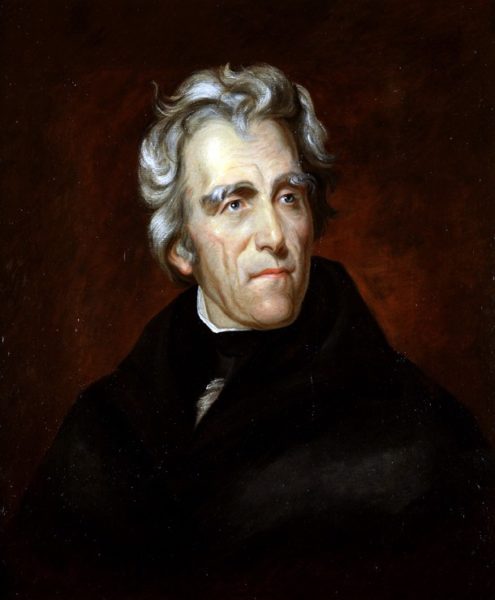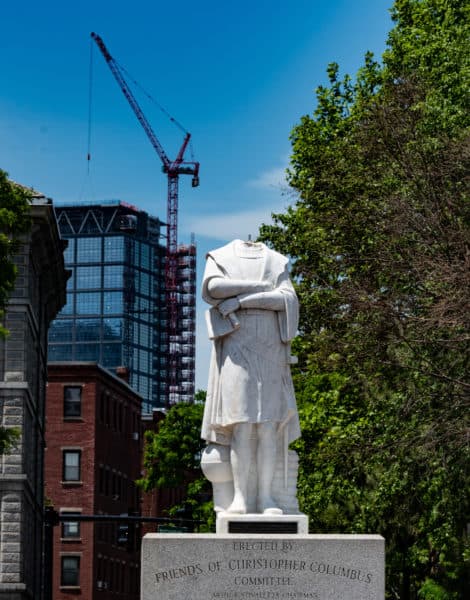When Loyalty to Your People is Treason to the State
Gregory Hood, American Renaissance, June 21, 2020
The George Floyd riots are a manufactured crisis, but the leader of America’s flagship conservative magazine is looking for ways to surrender. Rich Lowry recently endorsed removing Confederate statues and scorned the Lost Cause. “Secession was a traitorous act that threatened to destroy the American nation,” he wrote, “to create a rump republic built on slavery, and to make impossible the subsequent rise of the United States.” He dismissed fears that “woke iconoclasm” would create a slippery slope so that “first it’s Jefferson Davis, ultimately George Washington.” This feeling, he said, is a “mistake.”
Not long afterward, antifa defaced a statue of George Washington with the words “genocidal colonist,” decorated it with a burning American flag, and finally toppled it. Police did nothing. Conservatives were shocked. Shaun King celebrated, and thousands joined him online.
Let me be clear.
Every statue or monument of every person who owned human beings should be torn down.
By governments or by the people. Period.
Including all statues of George Washington and Thomas Jefferson.
They were despicable human beings. Monsters.
— Shaun King (@shaunking) June 19, 2020
The statue almost certainly won’t return.
Just spoke with the Regional Arts & Culture Council.
George Washington statue in Portland will be removed by crane TODAY and put in storage. No long term decisions made regarding reinstallation.
Spokeswoman for RACC says statue caused “harm” pic.twitter.com/7S0wQUY68y
— Zane Sparling (@PDXzane) June 19, 2020
Mr. Lowry is silent.
His problem is obvious. The Founding Fathers were traitors to the Crown. To paraphrase him, the Revolution was a traitorous act that destroyed the British Empire in North America, created a rump republic that tolerated slavery, and almost led to Great Britain being defeated by Napoleon. Napoleon’s onetime Foreign Minister Talleyrand famously quipped that treason is a matter of dates. It’s also a matter of who wins. The Revolution could easily have failed. We’d probably be part the British Commonwealth, and Washington would be our Benedict Arnold.
Like treason, morality is also a matter of dates. George Washington was a slaveholder, just like the Roman aristocrats the Founders modeled themselves on. In the American Revolution, the British were the ones who were promising freedom to slaves that would fight for their cause. It was the British threat to arm the slaves that drove many conservative Virginia planters to embrace revolution. This wasn’t because the British believed in racial equality. Manumission was a tool of war, like the Emancipation Proclamation.
Many revolutionaries, particularly Washington, were also frustrated by the British Empire’s plans to thwart westward expansion with the Proclamation of 1763. America needed independence so it could conquer and settle the continent. It’s because the Revolution was successful that whites could memorialize revolutionary heroes even on the West Coast — at least until now.

President Andrew Jackson, who in defense of his Indian policies, rhetorically asked Congress, “What good men would prefer a country covered with forests and ranged by a few thousand savages to our extensive Republic . . . ”
Was the Confederate cause so different? Like the American revolutionaries, the Confederates wanted to expand their territory by expanding into the Caribbean and Central America. They wanted to preserve their liberties against central authority. They saw themselves as heirs to the Founders. George Washington was on the Confederate seal and Stonewall Jackson praised his men’s sacrifices in their “second war of independence.”
The Southern economy was built on slavery. However, the Union would not have won the war if Maryland, Delaware, Missouri, and Kentucky had not remained under Federal control. “I hope to have God on my side,” Lincoln supposedly said, “but I must have Kentucky.” In retrospect, we know that the war meant the end of slavery in the United States. However, if either the Union or the Confederacy had won quickly, slavery probably would have been preserved. At the Hampton Roads peace conference of February 3, 1865 — with only two months before Appomattox — Lincoln tried to tempt the Confederates to lay down their arms in return for a chance to keep their slaves.
As for Robert E. Lee, he was a traitor no matter what he did. If he had fought for the Union, it would have meant betraying his state, Virginia. Why did the federal government deserve his loyalty any more than his state? The traditional conservative perspective expressed by Edmund Burke stresses loyalty to the “little platoons” of society. Loyalty is most intense at the local level. Lee’s action is no different than that of George Washington when he betrayed his allegiance to George IIII to fight for the colonies.
But ultimately — and surely Mr. Lowry should be able to see this by now — the details of the alleged crimes of the Confederates don’t matter. Their politics make them easy targets, but ultimately their crime was to be white. Frank Rizzo, Justice Roger Taney, the Texas Rangers, the pioneer man and woman at the University of Oregon, and of course Columbus were not Confederates. But their statues had to come down because they were white people who were “racist” by today’s standards. Of course, everyone who was dead by 1960 was a “racist,” as well as many if not all whites living today.

June 10, 2020, Christopher Park, Boston, Massachusetts: A headless Christopher Columbus statue in Boston. (Credit Image: © Keiko Hiromi / AFLO via ZUMA Press)
Loyalty to a “government” is an abstraction. Service to the state means little if that state doesn’t represent your race, ethnicity, or culture. No one fights and dies for the DMV. When the DNC ran an ad in 2012 that said, “Government is the only thing that we all belong to,” it was an implicit admission that Americans don’t have anything in common except a bureaucracy. America can’t even be a “proposition nation” when the country is so divided about what that “proposition” should be.
Loyalty matters when it’s personal. Loyalty mattes when you are defending real people for whom you’ve taken an oath. Loyalty is why you fight for your family, your blood, your culture, your people.
Are black fellow citizens “our people?” Many don’t seem to think so. If they want the Founding Fathers removed, it’s hard to see what kind of unity is possible. If I were black, I would have a hard time seeing much of a difference between one slaveholding Virginian and another. With the “1619 Project,” academics and journalists are teaching Americans that “racism” predates the United States. When statues of Christopher Columbus are destroyed, the message is that whites have no right to be here and that America is “stolen land.”
We might all go back to Europe if we could keep the Continent to ourselves, but it doesn’t work that way. They would follow us. There is no white country that is not under attack.
Former imperial powers such as Great Britain and France are being overrun by non-whites from their former colonies. Evidently, they didn’t really want independence. Countries that never had empires, such as Switzerland or Malta are also facing problems from non-white immigrants. The European Union is pressuring Poland and Hungary to accept mass Muslim immigration, even though these countries suffered from centuries of foreign occupation. In Iceland, in the name of Black Lives Matter, the Socialist Party leader wants to remove the statue of Ingólfr Arnarson, the country’s founder, a man who owned (white) slaves but probably never saw a black person in his life. The arguments change, but the goal is always the same. Whites must not have an identity. We can’t have a country. We can’t even have a town. We must be erased and replaced, and it’s “fragility” if we protest.
Removing Confederate statues will do nothing to appease those who want to erase white history and white people. Rich Lowry is missing the point, but that’s his job. It’s the job of the entire, shameful “movement” National Review claims to speak for. This conflict is not about the Confederacy, police unions, body cameras, President Trump, chokeholds, or the recreational drug habits of the late George Floyd. It’s about race. Do we have the right to exist or not?
Ultimately, the answer to that question doesn’t depend on conservatives or “elites,” or journalists, or President Trump. It depends on us: all whites around the world. Americans have a special calling. We’re a nation of revolutionaries who seceded from a system that no longer represented us. Loyalty to our people sometimes means treason to the system. George Washington and Robert E. Lee would expect nothing less.















